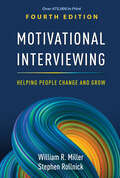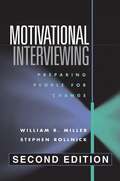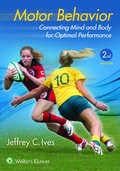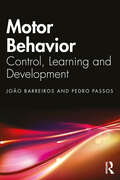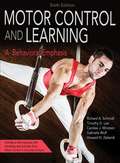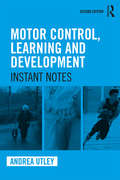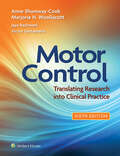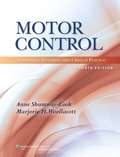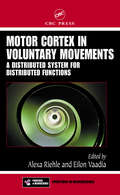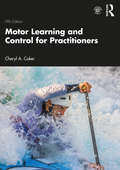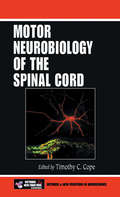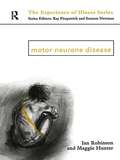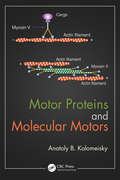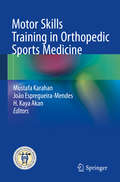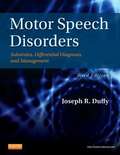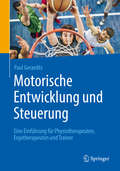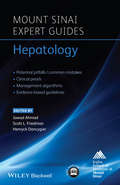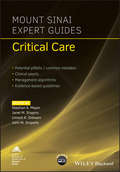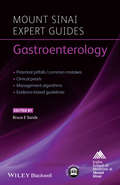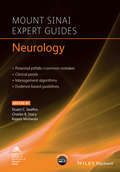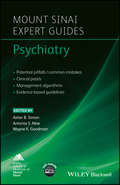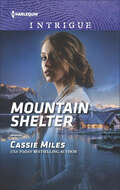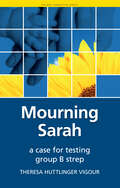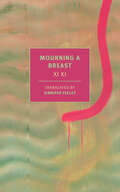- Table View
- List View
Motivational Interviewing: Helping People Change and Grow (Applications of Motivational Interviewing)
by Stephen Rollnick William R. MillerNow in a fully rewritten fourth edition, this is the authoritative presentation of motivational interviewing (MI), the powerful approach to facilitating change. It has been updated and streamlined to be even more user-friendly as a practitioner guide and course text. MI originators William R. Miller and Stephen Rollnick elucidate the four tasks of MI--engaging, focusing, evoking, and planning--and vividly demonstrate what they look like in action. A wealth of vignettes and interview examples illustrate the dos and don'ts of successful implementation in diverse contexts. The book reviews the evidence base for the approach and covers ways to assess the quality of MI. The companion website provides reflection questions, annotated case material, and additional helpful resources. New to This Edition *Most of the book is entirely new. *Addresses the breadth of MI applications not only in counseling and psychotherapy, but also in health care, education, coaching, management, and other contexts. *Discusses delivering MI remotely, simple versus complex affirmations, strategic use of directional questions, ethical considerations, and other new or expanded topics. *Increased emphasis on using MI throughout a client's process of change and growth, not just in the preparatory stage. Pedagogical Features *New or updated online materials, including reflection questions and annotated cases. *Key points at the end of each chapter. *"Personal Perspective" and "For Therapists" boxes in every chapter. *Extensive glossary. *New self-assessment tool that targets the component skills of MI. This book is in the Applications of Motivational Interviewing series, edited by Stephen Rollnick, William R. Miller, and Theresa B. Moyers.
Motivational Interviewing: Preparing People for Change (2nd edition)
by Stephen Rollnick William R. MillerHelping people with substance abuse and/or compulsive behavior problems, through counseling and interviewing
Motiverende gespreksvoering voor verpleegkundigen: Nieuwe inzichten in gespreksstrategieën
by Jos Dobber Jannet M. de JongeDit trainingsboek helpt studenten van verpleegkundige opleidingen om effectieve strategieën voor motiverende gespreksvoering te ontwikkelen. Het combineert basiskennis met nieuwe inzichten en oefeningen op verschillende niveaus. Daardoor is het geschikt voor studenten die een hbo- of masteropleiding volgen, en voor deelnemers aan specialistische verpleegkunde-opleidingen of trainingen motiverende gespreksvoering.Motiverende gespreksvoering voor verpleegkundigen - Nieuwe inzichten in gespreksstrategieën is opgebouwd uit twee delen. Het eerste deel behandelt de basis: wat is motiverende gespreksvoering, wanneer is het goed om het te gebruiken, en wanneer niet? Dit deel gaat ook in op de basishouding, -processen en -vaardigheden. Het tweede deel richt zich op gevorderde studenten, en behandelt onder meer die onderdelen van motiverende gespreksvoering die het effect van het gesprek kunnen bepalen (actieve ingrediënten), de verandermechanismen en de manier waarop dit in een gespreksstrategie kan worden verwerkt. Beide delen bevatten oefeningen en audiofragmenten van motiverende gesprekken.Jannet de Jonge is GZ psycholoog, trainer motiverende gespreksvoering, lid van het Motivational Interviewing Network of Trainers en onderzoeker aan het Center of Expertise Urban Vitality, Hogeschool van Amsterdam.Jos Dobber is hoofddocent aan de HBOV van de Hogeschool van Amsterdam en onderzoeker aan het Center of Expertise Urban Vitality.Beiden zijn gepromoveerd op het onderwerp motiverende gespreksvoering
Motor Behavior: Connecting Mind And Body For Optimal Performance
by Jeffrey IvesThis updated 2nd Edition of this highly: applied text goes beyond providing the basics of motor control (Unit 1) and motor learning (Unit 2) to helping students understand how these two distinct views interact and ultimately affect outcomes (Unit 3). Taking a functional approach, Motor Behavior, 2nd Edition reflects the most recent research and guidelines from the field and brings topics to life with unique photos and illustrations that show concepts in action. A final chapter offers insights on effective training and practice strategies that connect mind and body for optimal performance.
Motor Behavior: Control, Learning and Development
by João Barreiros Pedro PassosMotor Behavior: Control, Learning and Development explores the realm of Motor Behavior, a field intricately examining human action and movement across a lifetime – from their initial acquisition to refinement and evolution. This discipline provides a profound lens through which we comprehend the complex dynamics of human physicality.Presented across four sections, each progressively guiding the reader from fundamental insights into the workings of the human body to more intricate subjects pertaining to motor control and learning, Motor Behavior: Control, Learning and Development equips readers with a comprehensive understanding of the intricate mechanisms governing the human body during movement. Additionally, this book clarifies current perspectives on control and learning. Recognizing the perpetual evolution of science, there are short stories interspersed throughout the text. These narratives contextualize the unfolding tapestry of scientific knowledge, encouraging readers to adopt an open-minded stance toward the topic.Tailored for students navigating the academic terrain in both bachelor's and master's degrees, this cutting-edge new textbook is essential reading for all students in Motor Control, Motor Learning, Motor Development, Skill Acquisition courses, and related modules.
Motor Control and Learning: A Behavioral Emphasis
by Howard N. Zelaznik; Timothy D. Lee; Carolee J. Winstein; Gabriele Wulf; Richard A. SchmidtThis updated sixth edition builds upon the foundational work of Richard Schmidt and Timothy Lee in previous editions. The three new authors--each a distinguished scholar--offer a range and depth of knowledge that includes current directions in the field. The extensively revised content reflects the latest research and new directions in motor control and learning.
Motor Control, Learning and Development: Instant Notes, 2nd Edition (Instant Notes)
by Andrea UtleyAn understanding of the scientific principles underpinning the learning and execution of fundamental and skilled movements is of central importance in disciplines across the sport and exercise sciences. The second edition of Motor Control, Learning and Development: Instant Notes offers students an accessible, clear and concise introduction to the core concepts of motor behavior, from learning through to developing expertise. Including two brand new chapters on implicit versus explicit learning and motor control and aging, this new edition is fully revised and updated, and covers: definitions, theories and measurements of motor control; information processing, neurological issues and sensory factors in control; theories and stages of motor learning; memory and feedback; the development of fundamental movement skills; and the application of theory to coaching and rehabilitation practice. Highly illustrated and well-formatted, the book allows readers to grasp complex ideas quickly, through learning objectives, research highlights, review questions and activities, and encourages students to deepen their understanding through further reading suggestions. This is important foundational reading for any student taking classes in motor control, learning or behavior or skill acquisition, or a clear and concise reference for any practicing sports coach, physical education teacher or rehabilitation specialist.
Motor Control: Translating Research into Clinical Practice
by Marjorie H. Woollacott Anne Shumway-Cook Jaya Rachwani Victor SantamariaMotor Control: Translating Research into Clinical Practice, 6th Edition, is the only text that bridges the gap between current and emerging motor control research and its application to clinical practice. Written by leading experts in the field, this classic resource prepares users to effectively assess, evaluate, and treat clients with problems related to postural control, mobility, and upper extremity function using today’s evidence-based best practices. This extensively revised 6th Edition reflects the latest advances in research and features updated images, clinical features, and case studies to ensure a confident transition to practice. Each chapter follows a consistent, straightforward format to simplify studying and reinforce understanding of normal control process issues, age-related issues, research on abnormal function, clinical applications of current research, and evidence to support treatments used in the rehabilitation of patients with motor control problems.
Motor Control: Translating Research into Clinical Practice (4th Edition)
by Anne Shumway Cook Marjorie H. WoollacottThis book tries to reduce the gap between research and clinical practice that is created as a result of explosion of new research in the field of neuroscience and motor control.
Motor Cortex in Voluntary Movements: A Distributed System for Distributed Functions
by Alexa Riehle Eilon VaadiaAs one of the first cortical areas to be explored experimentally, the motor cortex continues to be the focus of intense research. Motor Cortex in Voluntary Movements: A Distributed System for Distributed Functions presents developments in motor cortex research, making it possible to understand and interpret neural activity and use it to recons
Motor Learning and Control for Practitioners
by Cheryl A. CokerWith an array of critical and engaging pedagogical features, the fifth edition of Motor Learning and Control for Practitioners offers the best practical introduction to motor learning available. This reader-friendly text approaches motor learning in accessible and simple terms and lays a theoretical foundation for assessing performance; providing effective instruction; and designing practice, rehabilitation, and training experiences that promote skill acquisition. Features such as Exploration Activities and Cerebral Challenges involve students at every stage, while a broad range of examples helps readers put theory into practice. The book also provides access to a fully updated companion website, which includes laboratory exercises, an instructors’ manual, a test bank, and lecture slides. As a complete resource for teaching an evidence-based approach to practical motor learning, this is an essential text for undergrad and post-grad students, researchers, and practitioners alike who plan to work in the areas of motor learning, motor control, physical education, kinesiology, exercise science, coaching, physical therapy, or dance.
Motor Neurobiology of the Spinal Cord (Frontiers in Neuroscience)
by Timothy C. CopeMotor Neurobiology of the Spinal Cord provides a comprehensive description of the experimental tools available for investigating the neuronal properties that allow populations of spinal cord neurons to control muscles responsible for limb movements and posture control. By integrating data from many new approaches, this text demonstrates how spinal cord circuits operate under a variety conditions and explores the new and exciting developments that are being made in motor neurobiology of the spinal cord. It also elucidates concepts and principles relevant to function and structure throughout the nervous system and presents information about changes induced by injury and disease.
Motor Neurone Disease (Experience Of Illness Ser.)
by Ian Robinson Margaret HunterMotor Neurone Disease is one of the most difficult conditions to manage medically and socially. A disease which leads to the loss of control of most muscle systems of the body, it has no known cause and no cure. For this reason, clinicians have traditionally been reluctant to reveal the diagnosis to sufferers or their families and the condition has become known as one of the best kept secrets of medical practice. However in recent years a number of organizations have set up to support sufferers and their families and consequently, the public profile of the condition has changed dramatically.Motor Neurone Disease provides an extremely helpful guide to the medical facts relating to the condition and considers the psycho-social effects on sufferers and those who care for them. It will be essential reading for doctors, nurses, social workers, physio-, speech and occupational therapists as well as all those suffering from Motor Neurone Disease, their families and carers.
Motor Proteins and Molecular Motors
by Anatoly B. KolomeiskyA Unified Microscopic Approach to Analyzing Complex Processes in Molecular MotorsMotor Proteins and Molecular Motors explores the mechanisms of cellular functioning associated with several specific enzymatic molecules called motor proteins. Motor proteins, also known as molecular motors, play important roles in living systems by supporting cellular
Motor Skills Training in Orthopedic Sports Medicine
by Mustafa Karahan João Espregueira-Mendes H. Kaya AkanThis book aims to provide orthopedic surgeons with all the information that they will require in order to set up and run a motor skills course that will meet the needs of junior staff in Orthopedic Sports Medicine and help in training better surgeons for the future. The coverage is wide-ranging, from the fundamentals of what it takes to be a sports surgeon through to validation methods that measure teaching effectiveness and the certification of surgical skills at the end of the course. Clear guidance is provided on how to teach concepts of surgical skill and the strategy and practical details of designing a training program, with inclusion of a helpful checklist of do's and don'ts. Different basic training modalities are described, with a particular focus on the FAST system adopted by the Arthroscopy Association of North America, and the role of simulators in surgical skills training is discussed. The book has been produced in cooperation with ISAKOS and the authors are leading professionals from around the world who offer a truly global and multidisciplinary perspective on the subject.
Motor Speech Disorders: Substrates, Differential Diagnosis, and Management (Third Edition)
by Joseph R. DuffyWith expanded and updated information including current techniques, approaches, and case studies, the 3rd edition of this bestselling book continues its reputation as a dependable and outstanding evidence-based source on acquired motor speech disorders in adults. It covers the substrates of motor speech and its disorders, the disorders and their diagnoses, and management -- focusing on integrating what is known about the bases of motor speech disorders with the realities of clinical practice to ensure readers have the key content they need to be effective practitioners.<p><p> <b>Key Features</b><p> Three-part organization first covers the neurologic underpinnings of speech, then the various disorders resulting from problems in the nervous system, and then the basic principles and disorder-specific management strategies.<p> Emphasis on evidence-based practice helps distill disparate information and stresses the best practices within motor speech disorders.<p> Cutting-edge research ensures this book contains the most comprehensive and up-to-date look at the state of motor speech disorders.<p> Case studies help clarify dense and difficult content and help hone your critical thinking skills. Summary tables and boxes offer easy access to important information such as causes and characteristics to aid in differential diagnosis.<p> Chapter outline and summary sections keep you focused on the most significant information.
Motorische Entwicklung und Steuerung: Eine Einführung für Physiotherapeuten, Ergotherapeuten und Trainer
by Paul GeraedtsDie Faszination der menschlichen Motorik wird in diesem Fachbuch verständlich und anschaulich dargestellt. Zahlreiche Praxisbeispiele verdeutlichen Physio- und Ergotherapeuten, Sportwissenschaftlern und Trainern entscheidende Eckpfeiler der einzelnen Entwicklungsschritte von der Kindheit bis ins Erwachsenenalter. Die direkten Auswirkungen unbewusster Steuerungs-, Automatisierungs- und Lernprozesse auf unser Leben werden präzise beleuchtet und entschlüsselt.Der Inhalt: Neurophysiologische Abläufe von automatisierten und Willkürbewegungen - Aus unserem Alltag: Okulo-, Grapho- und Sprachmotorik - Verborgene Potenziale in Training und TherapieVerhelfen Sie Ihrem Patienten in Rehabilitation und Therapie zum bestmöglichen Ergebnis. Nur mit diesen Grundlagen können Sie Athleten im Breiten- und Leistungssport optimal fördern und zum gewünschten Erfolg führen.
Mount Sinai Expert Guides
by Jawad Ahmad Henryk Dancygier Scott L. FriedmanMount Sinai Expert Guides: Hepatology will provide gastroenterology and hepatology trainees with an extremely clinical and accessible handbook covering the major liver diseases and symptoms, their diagnosis and clinical management. Perfect as a point-of-care resource on the hospital wards and also as a refresher for board exam preparation, the focus throughout is on providing rapid reference, essential information on each disease to allow for quick, easy browsing and assimilation of the must-know information. All chapters follow a consistent template including the following features:- An opening bottom-line/key points section.- Classification, pathogenesis and prevention of disease.- Evidence-based diagnosis, including relevant algorithms, laboratory and imaging tests, and potential pitfalls when diagnosing a patient.- Disease management including commonly used medications with dosages, when to perform surgery, management algorithms and how to prevent complications.- How to manage special populations, ie, in pregnancy, children and the eldery.- The very latest evidence-based results, major society guidelines (AASLD/EASL) and key external sources to consult.In addition, the book comes with a companion website housing extra features such as case studies with related questions for self-assessment, key patient advice and ICD codes.If you're specialising in hepatology and require a concise, practical guide to the clinical management of liver disease, bought to you by one of world's leading hospitals, then this is the perfect book for you.
Mount Sinai Expert Guides: Critical Care (Mount Sinai Expert Guides)
by Stephan A. Mayer Janet M. Shapiro Umesh K. Gidwani John M. OropelloPart of the Mount Sinai Expert Guide series, this outstanding book provides rapid-access, clinical information on all aspects of Critical Care with a focus on clinical diagnosis and effective patient management. With strong focus on the very best in multidisciplinary patient care, it is the ideal point of care consultation tool for the busy physician.
Mount Sinai Expert Guides: Gastroenterology
by Bruce E. SandsMount Sinai Expert Guides: Gastroenterology will provide physicians with an extremely clinical and accessible handbook covering the major GI diseases and symptoms, their diagnosis and clinical management. Perfect as a point-of-care resource on the hospital wards and also as a refresher for board exam preparation, the focus throughout is on providing rapid reference, essential information on each disease to allow for quick, easy browsing and assimilation of the must-know information. All chapters follow a consistent template including the following features:- An opening bottom-line/key points section- Classification, pathogenesis and prevention of disease- Evidence-based diagnosis, including relevant algorithms, laboratory and imaging tests, and potential pitfalls when diagnosing a patient- Disease management including commonly used medications with dosages, when to perform surgery, management algorithms and how to prevent complications- How to manage special populations, ie, in pregnancy, children and the elderly- The very latest evidence-based results, major society guidelines (ASG/ACG/UEGW) and key external sources to consultIn addition, the book comes with a companion website housing extra features such as case studies with related questions for self-assessment, key patient advice and ICD codes. Each guide also has its own mobile app available for purchase, allowing you rapid access to the key features wherever you may be.If you specialise in gastroenterology and require a concise, practical guide to the clinical management of GI disease, bought to you by one of world's leading hospitals, then this is the perfect book for you.
Mount Sinai Expert Guides: Neurology
by Rajeev Motiwala Charles B. Stacy Stuart C. SealfonMount Sinai Expert Guides: Neurology provides trainees in neurology with an extremely clinical and accessible handbook covering the major neurologic disorders and symptoms, their diagnosis and clinical management. Perfect as a point-of-care resource on the hospital wards and also as a refresher for board exam preparation, the focus throughout is on providing rapid reference, essential information on each disorder to allow for quick, easy browsing and assimilation of the must-know information. All chapters follow a consistent template including the following features: An opening bottom-line/key points section Classification, pathogenesis and prevention of disorder Evidence-based diagnosis, including relevant algorithms, laboratory and imaging tests, and potential pitfalls when diagnosing a patient Disease management including commonly used medications with dosages, management algorithms and how to prevent complications How to manage special populations, ie, in pregnancy, children and the elderly The very latest evidence-based results, major society guidelines and key external sources to consult In addition, the book comes with a companion website housing extra features such as case studies with related questions for self-assessment, key patient advice and ICD codes. Each guide also has its own mobile app available for purchase, allowing you rapid access to the key features wherever you may be. If you're specialising in neurology and require concise, practical and clinical guidance from one of the world's leading institutions in this field, then this is the perfect book for you.
Mount Sinai Expert Guides: Psychiatry
by Antonia S. New Asher B. Simon Wayne K. GoodmanThe Mount Sinai Expert Guides, published by Wiley and endorsed by Mount Sinai School of Medicine in New York, provide rapid access, point-of-care clinical information on the most common diseases in a range of different therapeutic areas. Each title focuses on a different speciality and emphasis throughout is on providing rapid-access, clear clinical guidance to aid physicians with point-of-care management of their patients. Each title is edited by a renowned specialist from Mount Sinai, normally the Chair of the department, who is responsible for recruiting key faculty members to author the chapters. A chapter template has been developed to which each chapter author must adhere, so as to ensure complete consistency across all the chapters in each book and also across every book in the series. Accompanying each book is a companion website containing accessory materials such as case studies, video clips, MCQs, patient advice and PQRI/ICD codes. Mount Sinai Expert Guides: Psychiatry will provide specialist trainees and recently qualified specialists in psychiatry with an extremely clinical, affordable and accessible handbook covering the specialty. It will be used as both a point-of-care resource in the hospital and clinical setting, and also as a refresher guide during preparation for board exams and re-certification. Focused on providing 100% clinical guidance on the most common conditions that psychologists encounter, it will present the very best in expert information in an attractive, easy to navigate informative and well-structured manner, with features such as key points, potential pitfalls, management algorithms, and national/international guidelines on treatment.
Mountain Shelter
by Cassie MilesA mountain hideaway is all that stands between a bodyguard and the killer after his beautiful client... As a highly skilled cyber security expert and bodyguard, there are few dangers Dylan Timmons can't handle. But his next assignment brings unexpected risks. Hired to protect brilliant-but socially reclusive-neurosurgeon Jayne Shackleford, Dylan seeks answers in what he suspects was a foiled kidnapping attempt. As the daughter of an oil tycoon, Jayne is the perfect target for ransom, so retreating to the mountains is the first step in keeping her safe. The second step is remaining vigilant in their secluded surroundings-and resisting the beautiful brunette with a target on her back.
Mourning Sarah
by Theresa Huttlinger Vigour‘In this astonishing read, we follow Vigour's journey into darkness and loss, a gripping pilgrimage that leads to eventual knowledge and empowerment. This lucid book should be required reading for any woman headed to the maternity ward. This unforgettable book reveals what would have happened to my son and family had he not been treated for group B strep at birth. Let's celebrate Vigour's brave testimony here and take heed of her hard-won insights on the medical establishment that surrounds the birth experience.’ Paul Morris, Director, Master of Liberal Studies Program, Arizona State University, USA ‘A tragic story, clearly told. Theresa shares the confusion, pain and devastation she and her family experienced around the time of her daughter, Sarah's, birth and early death from potentially preventable group B Strep infection. Many who have suffered similar losses will draw comfort from this book, knowing that they aren't alone. Thankfully, as Theresa outlines, measures are now in place in the US that ensure most group B strep infections in babies are prevented there – in the UK, we're yet to achieve this, though we continue to campaign for such measures to be introduced. Perhaps were the decision makers to read this book, it would happen sooner - I fervently hope so.’ Jane Plumb, Chairman, Group B Strep Support, UK ‘Mourning Sarah is filled with important, even urgent, messages for any woman having a baby right here, right now, and for all young girls who soon will grow into womanhood and want babies of their own. Theresa Vigour articulates the unspeakable loss of her daughter using every hue in the emotional rainbow. Her account is exquisite, her metaphors masterful, and throughout the book, she skilfully weaves her inner and outer worlds. Theresa Vigour has given us a gift.’ Lorraine Ash in her Foreword 'Deep was the grief that came with the death of Theresa Vigour's newborn daughter, Sarah. Yet profound is this memoir of her mother's journey. It is a gift to see such raw and visceral emotion transformed into beautiful and evocative prose that touch and teach and heal.' Walt Harrington, author of The Everlasting Stream
Mourning a Breast
by Xi XiBy Xi Xi, part of the first generation of writers raised in Hong Kong, a wise and amiably written book of autobiographical fiction on the author&’s experience with breast cancer—from diagnosis to treatment to recovery—and her passage from a life lived through the mind into a life lived through the body.In 1989, the acclaimed Hong Kong writer Xi Xi was diagnosed with breast cancer. Her semi-autobiographical novel Mourning a Breast is a disarmingly honest and inventive account of the author&’s experience of a mastectomy and of her subsequent recovery. The book opens with her putting away a bathing suit. As the routine pleasure of swimming is revoked, the small loss stands in for the greater one. But Xi Xi&’s mourning begins to take shape as a form of activism. Addressing her reader as frankly and unashamedly as an old friend, she describes what she is going through; finds consolation in art, literature, and cinema; and advocates for a universal literacy of the body. Mourning a Breast was heralded as one of the first Chinese-language books to cast off the stigma of writing about illness and to expose the myths associated with breast cancer. It is a radical novel about creating in the midst of mourning.
